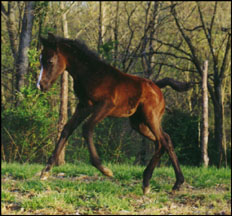 Wadduda
of the Desert is presented as a child’s tale, and children
will no doubt enjoy it, but it is not a childish book. Adults will find
themselves enjoying it as well. There is much in this little volume which
is rarely found in juvenile literature. It has a nice bibliography. Some
of the subject matter is not going to appear on the reading lists of most
American schools. It deals with African slavery in Arabia in the 1900 era.
The death of a mare in foaling is part of it, as is death in battle of
one of its characters. The stern aspects of the Bedouin raiding culture
are an intrinsic background, as is human malevolence. The presentation
is not of disturbing character, but kids who read this will be exposed
to concepts of Middle Eastern history which would be out of place in Alice
in Wonderland. Wadduda
of the Desert is presented as a child’s tale, and children
will no doubt enjoy it, but it is not a childish book. Adults will find
themselves enjoying it as well. There is much in this little volume which
is rarely found in juvenile literature. It has a nice bibliography. Some
of the subject matter is not going to appear on the reading lists of most
American schools. It deals with African slavery in Arabia in the 1900 era.
The death of a mare in foaling is part of it, as is death in battle of
one of its characters. The stern aspects of the Bedouin raiding culture
are an intrinsic background, as is human malevolence. The presentation
is not of disturbing character, but kids who read this will be exposed
to concepts of Middle Eastern history which would be out of place in Alice
in Wonderland.
 Wadduda
of the Desert has implications for the breeding of Davenport
horses. It fills a need for romantic children’s liter-ature about Davenport
horses. The late Joyce Gregorian Hampshire, who was one of our bright lights
as a Davenport breeder, as well as President of Al Khamsa and an accomplished
fan-tasy novelist, had hoped to promote such writing as a means of bringing
young people into our Davenport community. Wadduda
of the Desert has implications for the breeding of Davenport
horses. It fills a need for romantic children’s liter-ature about Davenport
horses. The late Joyce Gregorian Hampshire, who was one of our bright lights
as a Davenport breeder, as well as President of Al Khamsa and an accomplished
fan-tasy novelist, had hoped to promote such writing as a means of bringing
young people into our Davenport community.
 This book
may well do that, and the long-term effect could be considerable. It has
a most attractive air of romance, adventure, and realism, which should
have strong appeal, especially since these narrative elements have almost
dropped out of our current plodding Arabian horse literature. In reading
this book, however, it should be kept in mind that it is a novel: it is
fiction. It has its own truth of feeling and imagination, but it should
not be taken as a literal, historical treatise. This book
may well do that, and the long-term effect could be considerable. It has
a most attractive air of romance, adventure, and realism, which should
have strong appeal, especially since these narrative elements have almost
dropped out of our current plodding Arabian horse literature. In reading
this book, however, it should be kept in mind that it is a novel: it is
fiction. It has its own truth of feeling and imagination, but it should
not be taken as a literal, historical treatise.
 We can accept
and enjoy Walter Farley’s Black Stallion series as good fun. We ought to
take Wadduda of the Desert in the same way, and maybe some day we will
be fortunate enough to see it as a movie, too. If that time comes, surely
among all the Davenport horses we can find the look-alike to play the part
of the original Wadduda of the Desert. We can accept
and enjoy Walter Farley’s Black Stallion series as good fun. We ought to
take Wadduda of the Desert in the same way, and maybe some day we will
be fortunate enough to see it as a movie, too. If that time comes, surely
among all the Davenport horses we can find the look-alike to play the part
of the original Wadduda of the Desert.
 Jean Ivey,
the author, is a long-term breeder of Arabian horses, including descendants
of the original *Wadduda 30 of the Homer Davenport importation of 1906.
Her starting idea in writing the book was to record stories which she had
told her own children. Her audience has grown to include many others of
us. We look forward to further adventures of "Wadduda" and her
trusty sidekick, Said Abdallah. Jean Ivey,
the author, is a long-term breeder of Arabian horses, including descendants
of the original *Wadduda 30 of the Homer Davenport importation of 1906.
Her starting idea in writing the book was to record stories which she had
told her own children. Her audience has grown to include many others of
us. We look forward to further adventures of "Wadduda" and her
trusty sidekick, Said Abdallah.

Diboll (1998) , owned by PeggySue, Pulaski
TN
|


![]()